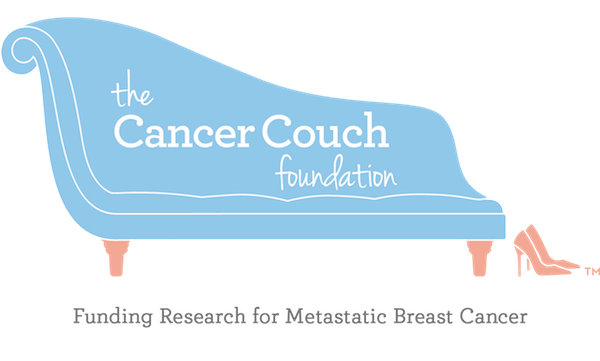On The Couch With…Dr. Sarat Chandarlapaty
A(n) Officer Researcher And A Gentleman…
One of the many things that makes The Cancer Couch different from other foundations is our direct and intimate relationship with our few, select researchers. This is by design so that we can provide donors, who are interested in having a more direct line on where their money is going, the kind of updates and information that you will read here. I am so proud to introduce our research partner at Memorial Sloan Kettering Cancer Center (MSKCC), the brilliant, humble, dedicated, kind and class-act man that is… Dr. Sarat Chandarlapaty. Sarat’s name was one that came up over and over again at the beginning of my quest for the best and the brightest metastatic breast cancer researchers. Like Nikhil Wagle, at Dana-Farber, this amazing man has dedicated his career to eradicating this disease. From our very first conversation, Sarat has been nothing but cooperative, patient and generous in his time and assistance in helping us choose the right projects to fund for our purposes.
However, not only is he an amazingly talented and bright researcher and oncologist, he is just an absolutely lovely human being. I might add…and so is his wife! We had the pleasure of hosting them at our signature fundraising event in September, The Cancer Beat, and everyone enjoyed meeting them and getting to know them both in a fun, informal setting. Both Sarat and Nikhil will be speaking at this year’s Cancer Beat on September 16th, 2017. They will provide updates on the research we are funding and explain future goals. Without further adieu, please take a moment to watch this video about our partnership with Sarat, and read our interview to learn more about this very special person:
Thank you so much Sarat, and your team, for all that you are doing to give hope to so many. Please know that you are our heroes and we are silently cheering for you guys everyday! Keep up the great work…if you’re still reading this – get back to that lab please!!! 🙂
One of the many things that makes The Cancer Couch different from other foundations is our direct and intimate relationship with our few, select researchers. This is by design so that we can provide donors, who are interested in having a more direct line on where their money is going, the kind of updates and information that you will read here. I am so proud to introduce our research partner at Memorial Sloan Kettering Cancer Center (MSKCC), the brilliant, humble, dedicated, kind and class-act man that is… Dr. Sarat Chandarlapaty. Sarat’s name was one that came up over and over again at the beginning of my quest for the best and the brightest metastatic breast cancer researchers. Like Nikhil Wagle, at Dana-Farber, this amazing man has dedicated his career to eradicating this disease. From our very first conversation, Sarat has been nothing but cooperative, patient and generous in his time and assistance in helping us choose the right projects to fund for our purposes.
However, not only is he an amazingly talented and bright researcher and oncologist, he is just an absolutely lovely human being. I might add…and so is his wife! We had the pleasure of hosting them at our signature fundraising event in September, The Cancer Beat, and everyone enjoyed meeting them and getting to know them both in a fun, informal setting. Both Sarat and Nikhil will be speaking at this year’s Cancer Beat on September 16th, 2017. They will provide updates on the research we are funding and explain future goals. Without further adieu, please take a moment to watch this video about our partnership with Sarat, and read our interview to learn more about this very special person:
- Me: What was it that inspired you to dedicate your career to the study of mbc?
Sarat: The focus of my research took a gradual turn towards metastatic breast cancer (MBC). I reentered the laboratory with the interest in understanding the molecular pathways that help turn a normal cell into a cancer cell. I hoped that through such an understanding we could develop drugs that target those pathways and lead to therapies that are more effective while also having less side effects. My attention was turned to breast cancer because of some of the early work going on with targeting the HER2 protein in this disease. As my laboratory work progressed in studying HER2, I began seeing more and more patients suffering from MBC in the clinic. This led me to observe the great complexity of MBC, the limited understanding that we have of this disease state, and of course the gravity of the situation. My laboratory and clinical work followed, and we began to focus on understanding MBC in the hopes of developing better therapies for MBC within the different subtypes (estrogen receptor positive, HER2 positive, triple negative). - Me: What do you find most gratifying about your work in the field of mbc?
Sarat: I find the courage of patients to be the most gratifying aspect of the work. Every week in clinic I am awed and humbled by the courageousness that I see in patients facing this disease. Whether its dealing with symptoms of cancer or side effects of treatments, giving of their time, willingness to undergo biopsies… in so many different circumstances I walk away from clinic with great appreciation for patients. It is inspiring and never leaves me asking why we need to work harder and smarter in the lab. - Me: Most difficult/upsetting?
Sarat: The complexity of MBC is often very upsetting. For every step where we make progress, we feel the constraints of a complex disease for which one singular ‘magic bullet’ is not likely to be found. It is natural to want the discoveries and treatments of today to help every single patient and it is frustrating to recognize that this won’t be possible – that there is more work to be done and that there are not just 1 or 2 types of breast cancers – but many more than that. - Me: What do you most want people to know who are considering donating to The Cancer Couch to fund your research? What have you been able to do with the money we have been able to give so far? What do you still hope to do?
Sarat: I would like potential donors to know that the work we are doing with The Cancer Couch funds is focused on developing new and better treatments for MBC. Our laboratory is conducting patient-centered research with these funds. We are studying the findings from biopsies of patients with MBC, developing laboratory models of MBC, and testing how existing or new therapies work in those models. One example of this is understanding how a relatively new therapy works and how some MBCs develop resistance to it. We have begun generating breast cancer models resistant to CDK4/6 inhibitors based on our findings in a few patients and found one specific way that tumors become resistant. We are now beginning the process of developing new therapies against this form of resistance. We are hopeful this will help us to have a highly effective, “next-in-line” therapy with the overall goal of generating drug combinations that work much longer than the individual treatments or sequential therapies that help convert MBC into a “chronic and manageable disease state”. - Me: How close do you think we are to making mbc a chronic, manageable disease and where do you think the future is in treatment (i.e., precision medicine, immunotherapy, etc.)
Sarat: We have certainly made progress in extending how long patients can live with MBC on average – but within the details we recognize there are three groups of patients – one for whom MBC is indeed a chronic and manageable disease, another for whom treatments work for a few years but then fail, and a third for whom treatments don’t work at all. More patients exist in the latter two groups unfortunately. It goes without saying that we need to understand why treatments work in the first group as well as why they don’t in the latter two groups, if we want to make progress. In this regard, I think that precision medicine and hormonal therapies will be the key for one set of patients (these therapies do work for some) but newer therapies like immunotherapies or cell cycle therapies are desperately needed for the others.
Thank you so much Sarat, and your team, for all that you are doing to give hope to so many. Please know that you are our heroes and we are silently cheering for you guys everyday! Keep up the great work…if you’re still reading this – get back to that lab please!!! 🙂



